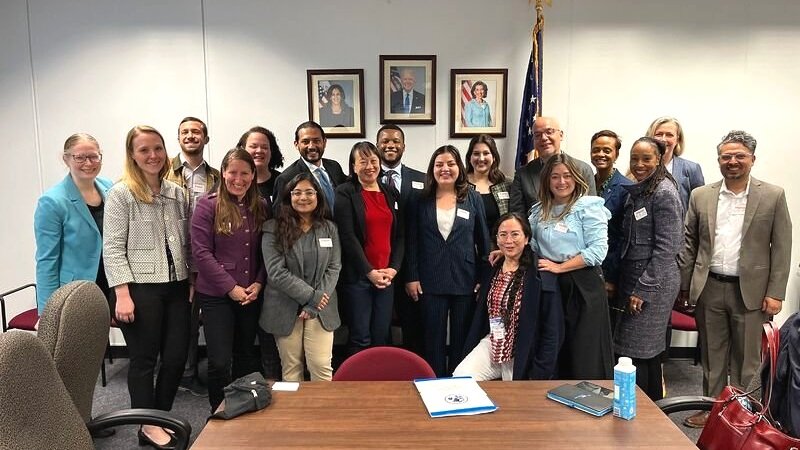Legislative Advocacy
The Workforce Development Council of Seattle-King County (WDC) aspires to lead transformative change that will evolve our region’s workforce development efforts into an innovative industry, community, and outcome driven system with racial equity at its core. As a nonprofit, grant-making organization, the WDC collaborates with a diverse set of partners to elevate job quality, economic growth, and prosperity for adults and youth throughout the Seattle-King County region.
Learn more about the WDC’s work.
The WDC serves as the Local Workforce Development Board, designated by the City of Seattle Mayor and King County Executive, to set policy and administer federal workforce development funds under the Workforce Innovation and Opportunity Act (WIOA).
As a workforce intermediary, we partner with over 40 community based organizations and reach nearly 40,000 job seekers and 3,000 businesses on an annual basis.
Capitol Hill briefing on what Congress can do to close the digital skill divide. From left to right: Rachel Unruh, Chief of External Affairs, NSC; Caroline Treschitta, Senior Government Affairs Manager, NSC; Robert Guzman, External Affairs Director, ScaleLIT; Marisol Tapia Hopper, Director of Strategic Partnerships and Funding, WDC; Constance Green, WIOA Adult & Dislocated Worker Programs State Coordinator, Virginia's Community Colleges System.
The Latest From Our Policy Blog
The Local Landscape
The Seattle King County region is the largest labor market in the state of Washington. It represents one-third of Washington’s workforce and nearly 42% of all nonfarm jobs (Employment Security Department, King County). The region has long been recognized for its impressive economic growth. On the surface, King County appears to have recovered from the downturn sparked by COVID-19 with gradual improvements in job growth and labor force participation.
However, the current structure of our regional economy and labor market (pre- and postpandemic) produces racial gaps in employment and wages, with stark occupational segregation in access to quality jobs, resulting from systemic barriers that have been constructed over time to benefit White people at the expense of Black, Indigenous, and People of Color (BIPOC).
In collaboration with our partners, WDC pursues comprehensive solutions that elevate job quality and address racial and economic disparities.
Over the past three decades, job growth in the region has concentrated among low-wage jobs while wage increases have primarily benefited higher-paying occupations (Advancing Workforce Equity in Seattle: A Blueprint for Action, pg. 24).
Income Inadequacy Rate in King County by Public Use Microdata Areas (PUMAs) (Overlooked and Undercounted Struggling to Make Ends Meet in Washington State, pg. 32)
The Challenges
Economic Insecurity
Having a job is often not enough to guarantee financial stability or provide a pathway for upward economic mobility. King County has the highest cost of living in the state as over 27% of the state’s struggling households live in the region.
Benefits Cliff
Benefits cliffs occur when people lose work supports as their income rises, even modestly. Often, earning $1 over a specific eligibility threshold results in a reduction or complete loss of essential work supports, like food stamps or childcare assistance. Current policies and structural barriers not only discourage career advancement among low-income workers but also create significant barriers on the path to long-term economic security. A crucial aspect of establishing pathways to economic mobility involves evaluating the interplay between benefits cliffs, workforce development, and policy considerations.
Our Priorities
Federal workforce funding has declined by two-thirds since its peak in the 1970s despite the labor force expanding by 50%.
In response, Washington has made two of its most significant workforce investments in years: Economic Security for All program and Community Reinvestments Project.
The Workforce Development Council of Seattle-King County administers these programs to build towards a thriving economy across the region.
Economic Security for All (EcSA)
EcSA establishes a dedicated state funding stream that integrates and enhances existing workforce and support programs, maximizing their collective impact. Unlike traditional programs focused solely on job placement, EcSA prioritizes quality employment outcomes, career advancement, and comprehensive wraparound support—all within a single program.
Our Position:
Maintain funding for EcSA, with ongoing appropriations to ESD of $20.7 million for core services. Adjust funding levels for caseload and inflation.
Simplify ESD funding streams under a maintenance budget line item to support local boards’ business services to help people move out of poverty and into self-sufficiency.
Continue the interagency agreement with ESD and Commerce to direct $48.25 million of Community Reinvestment Project funds to enhance EcSA’s pro-equity poverty reduction services.
Community Reinvestment Project (CRP)
Administered by the Washington State Department of Commerce and in partnership with local workforce boards, the Community Reinvestment Project is a vital initiative that addresses community empowerment, workforce needs, and justice-impacted individuals while promoting economic growth.
The CRP uses a community-driven approach to guide the development and delivery of impactful programs to address racial, economic, and social disparities and help individuals develop or enhance their skills to move to self-sufficient employment and long-term economic stability for themselves and their families.
Our Position:
We support the continuation of the Community Reinvestment Project initiatives and partnership with local workforce boards, with ongoing funding to promote economic stability for families and thriving communities through the continuation of the following initiatives:
Provide customers with resources to help meet basic needs as they actively pursue training toward their career goals.
Support small businesses with grants, customized training programs, hiring needs, and other assistance to promote economic development.
Offer financial coaching and Matched Savings Accounts to help customers purchase a home, invest in education or their business, or purchase other assets that support economic mobility and stability.
Meeting with the Department of Commerce and National Telecommunications and Information Administration (NTIA) staff organized by the National Skills Coalition to discuss the Digital Equity Act and funding for the Broadband Equity Access and Deployment Program.
Keep Up With Us!
Stay up-to-date on our advocacy work by connecting with us on social media or signing up for our newsletter.
To connect with our Advocacy team, reach out to Marisol Tapia-Hopper, Director of Strategic Partnerships & Funding.
















